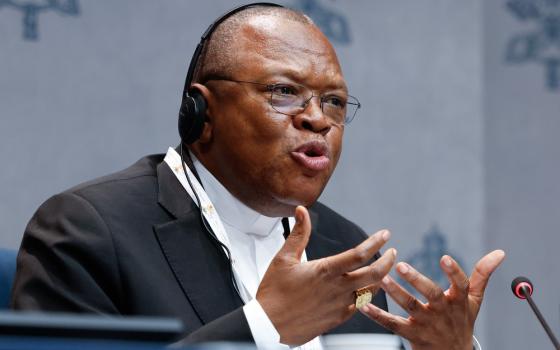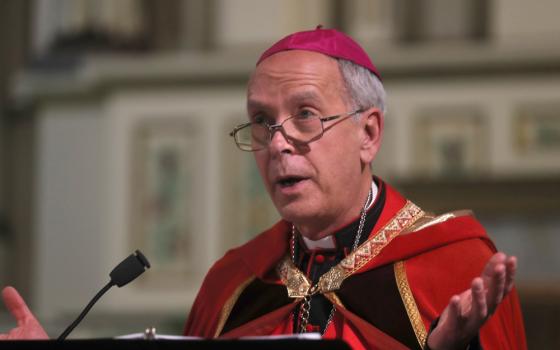Given all the negative and disheartening news we have been hearing about the Catholic Church in recent years, it's good to be reminded of some of the positive things about Catholicism, in addition to its sacramental life and (sometimes) vibrant parish life.
So writes my colleague and friend, Brad Malkovsky, one of the best and most popular teachers in Notre Dame's theology department. He reports that his undergraduate students have responded "quite well" to what he calls "Three Strengths of Contemporary Catholicism."
The first strength is Catholicism's openness to other religions, especially after Vatican II. It must be noted that Prof. Malkovsky specializes in comparative theology and is an expert in Hinduism, having spent a good part of his graduate studies in India.
The Catholic Church, he says, has led the way here and has set an example of collaboration and sharing with other religions that is truly prophetic.
Because the short document spent so much space (its last three pages) on Judaism and anti-Semitism, Jews have rightly made a lot of the council's Declaration on the Relationship of the Church to Non-Christian Religions, better known perhaps by its Latin title Nostra aetate ("In our times").
The late Cardinal-Archbishop of Vienna, Franz König, referred to Nostra aetate as "one of the most, if not the most, important" of all of the council's declarations ("It must be the Holy Spirit," The Tablet, December 21/28, 2002, p. 6).
The document underlines the point that the Catholic Church "rejects nothing of what is true and holy" in other religions and stresses the importance of dialogue with them.
According to Cardinal König, "This briefest of declarations owes its existence to three people without whose determination, dedication and patience it would never have come about."
They were Pope John XXIII, who was determined to put an end to accusations that the Catholic Church is anti-Semitic; Cardinal Augustin Bea, one of the major figures at Vatican II who was asked by the pope shortly after John XXIII's election to consider how the Jewish question could be incorporated into the council; and Msgr. John Österreicher, a native Austrian and a convert from Judaism who had fled from Austria to the United States before World War II.
In 1964, Pope Paul VI established the Secretariat for Non-Christians, and in 1988 Pope John Paul II gave it its present title, namely, the Pontifical Council for Interreligious Dialogue.
The second strength, according to Prof. Malkovsky, is the Catholic Church's openness to scientific research. Instead of simply dismissing every finding of the scientific community as unbiblical, there is a greater willingness on the part of the Catholic Church today to ask, "What is the possible theological significance of the data yielded by the new research?"
Evolution is now generally accepted, and has been since the days of Pope Pius XII (1939-58). Catholics, except those who are more influenced by evangelical and fundamentalist Protestant-ism than by the teachings of the Catholic Church, are not part of the evolution-versus-creationism debate. That issue is settled as far as the Catholic Church is concerned.
The Catholic Church teaches that God is the creator of the universe, but how God accomplished creation is compatible with evolution (see the many references in the Catechism of the Catholic Church under "Creation").
However, Prof. Malkovsky reports that most of his students were unaware of the church's teaching. I assume that many of his students think that evolution is incompatible with Catholic doctrine.
Prof. Malkovsky also reports that Wikipedia has a good article on this issue. I might add that the one-volume HarperCollins Encyclopedia of Catholi-cism, which I edited, has an excellent entry on "evolution" by John Haught (pp. 497-99) and another excellent entry on "creation" by Sr. Elizabeth Johnson, C.S.J. (pp. 375-76).
The third strength, according to Prof. Malkovsky, is that Catholic social teaching is the most developed among the world's religions. The Catholic promotion of human rights and justice in all spheres of life -- social, economic and political -- is unique among all religions and is also too little known among Prof. Malkovsky's students.
Most of his students have never heard of liberation theology, either, or the "preferential option for the poor," which Pope John Paul II endorsed in his encyclical, Centesimus annus ("The hundredth year" [after Pope Leo XIII's Rerum novarum], n. 11).
A very good link on the main themes, documents and issues of Catholic social teaching, according to Prof. Malkovsky, can be found here.
I would also recommend my own article, "An Ecclesiological Analysis of Catholic Social Teachings," in Catholic Social Thought and the New World Order, University of Notre Dame Press, 1993, pp. 147-77.
© 2011 Richard P. McBrien. All rights reserved. Fr. McBrien is the Crowley-O'Brien Professor of Theology at the University of Notre Dame.


